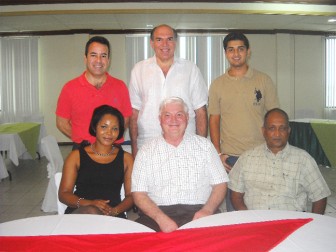A US-based consortium is examining building Guyana’s first oil refinery in the next 18 months, to provide cheaper fuel in an initial investment estimated at US$75M.
“It is expected that within 18 months, an estimated US$75M will be spent to establish the facilities which will also be providing over 100 jobs and ultimately see cheaper fuel for Guyana,” said a statement from the companies, Prime Energy and Chemical LLC, Kuai Energy Systems and Chemex LLC of the US.

Company officials told Stabroek News yesterday that they have the support of the government and an information session with stakeholders is scheduled for today at the Princess Hotel. There are still several issues that have to be worked out, such as the location of the proposed mini-refinery and the finalisation of the concept.
Chief Executive Officer of Chemex Jerry Brooks said that it will be another six months before they can start and it would take 12 months to build the refinery.
Dr. Turhane Doerga, International Director of Prime Energy and Chemical LLC, said that they have been examining the idea for a while now and decided to go ahead a few weeks ago. He pointed out that Guyana has been looking at how the country can have affordable energy and as businessmen they looked at whether this is feasible. “We are one of the people who came to the conclusion that this is very doable,” Doerga said. He added that the “modular refinery” is different from the traditional concept, with the refinery re-sized to suit the market. “We will design it based on what the need is in Guyana and it is modular so if need be we can expand it,” he explained.
Brooks said that they will be sourcing crude oil from where ever they can get the best deal and listed Suriname, Venezuela, Colombia, Guatemala, Ecuador and Peru as available sources. He noted that Colombia is doubling the capacity of the pipeline coming out of that country so that they can double their exports while Venezuela is always looking for good markets. “The transportation cost from Venezuela to here would give us a price advantage,“ he said, while singling out Guatemala and Ecuador as well. “We’re looking for the best oil that we can make the maximum amount of finished product from the cheapest crude we can find,“ he said.
Should Guyana strike oil, they would be looking to get the crude from here too, Doerga said.
Director of Finance at Prime Energy Carlos Villegas noted that Guyana is importing 100% of the fuel it consumes and the refinery will bring many benefits. “You’re going to create jobs, you’re going to (create) a lot of other industries around the oil industry, you’re going to be able to create infrastructure, wealth,” as well as help in tackling the balance of payments, he said, adding that the local market will grow when there is cheaper energy.
He said that the project is a complete private sector project and the government will not be asked to put in money. “We have a strong project that is bankable,” he said, noting that they have already knocked on some doors and got an “excellent reception.” The project will be funded by a mixture of equity and financing, he said. Further investment could be seen if the economy grows and another refinery can even be set up depending on the market, he added.
The consortium has been looking at the options here, including the port and Brooks said that while the engineering on this has not yet been done, it may require another single point to unload the crude. It was pointed out that a “full-scale port” is not necessary but a pier where a pipeline will run to unload the oil from a tanker.
Doerga said that the main market focus will be Guyana and while the Amaila Hydropower plant will be “competition,” they are confident that power will remain in demand particularly as Guyana develops and investments come in. “We feel Guyana needs the hydropower plant but you also need this, that’s why we’re doing it,” he said.
He said that they are serious about the project and President Bharrat Jagdeo has told them that anything that helps the economy is welcomed. “We’re sincere about this thing. We’re convinced that it will work for us because we do it to make money but we are convinced that it’s good for Guyana too,” he said, pointing to the creation of jobs. The design of the refinery will be as cost effective as possible and tailor made for the economy, said Raul Arrondo, Director of Energy Systems at Prime Energy.
Chemex LLC, according to its website, is a leading supplier for new and used modular refinery equipment. Chemex’s staff is able to match clients’ oil and gas project needs with new or existing, used modular plants and equipment, it said. By utilising rebuilt or used modular plants and equipment as opposed to new construction, clients are able to bring their projects on stream much sooner, seize project economic returns quicker and reduce project capital cost.
“Clients choose what equipment will be new, used or rebuilt. Chemex engineers can mix and match the processing units to build the small refinery or gas processing plant you need. Chemex has constructed or modified 56 modular refineries and gas plants since 1974,” the website says, listing a number of its clients, including Texaco, Shell, Mobil and Chevron, among others.




